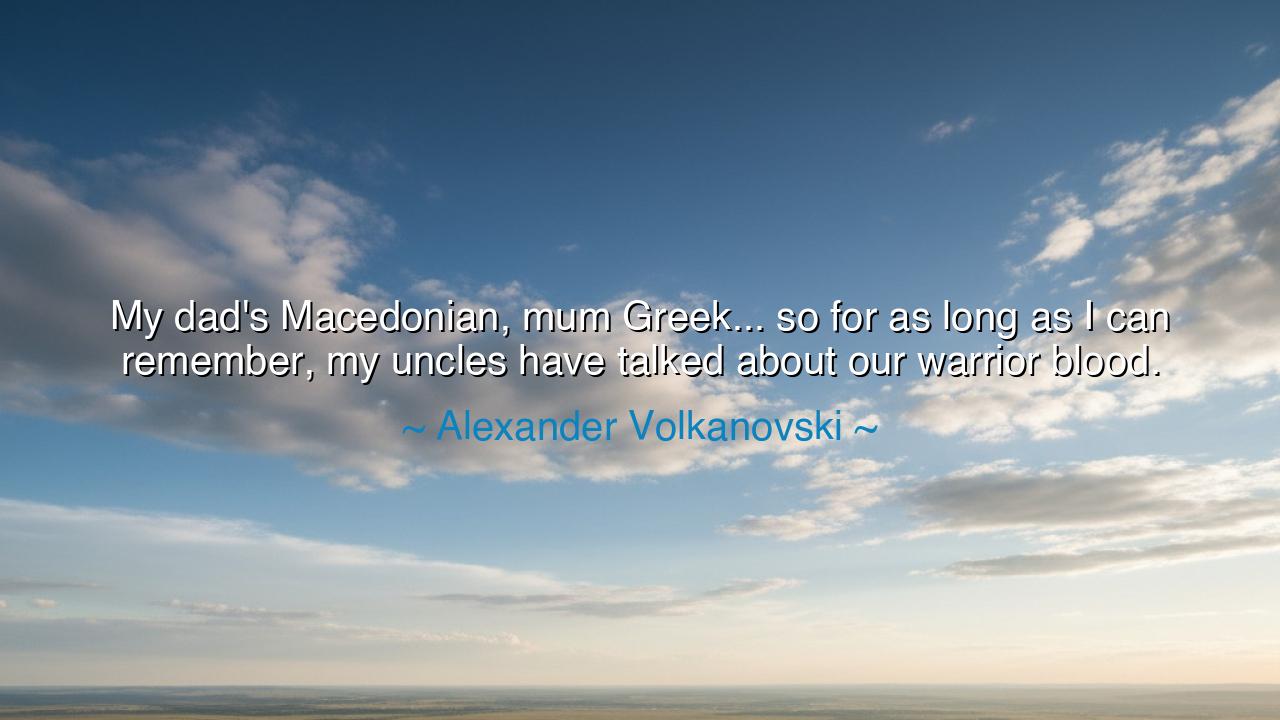
My dad's Macedonian, mum Greek... so for as long as I can
My dad's Macedonian, mum Greek... so for as long as I can remember, my uncles have talked about our warrior blood.






The words “My dad’s Macedonian, mum Greek... so for as long as I can remember, my uncles have talked about our warrior blood,” spoken by Alexander Volkanovski, are more than a statement of ancestry — they are a declaration of identity, pride, and spiritual inheritance. Within them resounds the eternal echo of history, where nations were forged not merely by borders but by blood, valor, and memory. The fighter’s words reveal the timeless truth that our lineage is not only in our veins but in the values passed down through generations. His uncles spoke not only of warriors of old but of the fire of perseverance that lives on within their descendants.
To speak of “warrior blood” is not to glorify battle for its own sake, but to honor the courage that faces adversity with unbroken spirit. In the ancient world, both Macedonians and Greeks revered the virtues of the warrior — honor, endurance, and self-mastery. To them, combat was not only of the body, but of the soul. Volkanovski, a modern champion in the fighting arenas of our time, carries forward that sacred inheritance, but his battleground is no longer the plains of Chaeronea or the walls of Troy — it is the octagon, where strength, discipline, and courage still determine a man’s fate. Thus, in his words, the past breathes within the present; the warrior spirit of antiquity finds new form in the discipline of modern struggle.
The Macedonian and Greek roots of his bloodline are steeped in tales of heroes. From Alexander the Great, who conquered half the known world before his thirty-third year, to Leonidas and his three hundred Spartans who stood unflinching before the Persian host — their courage was not born of violence, but of conviction. They believed that to fight for one’s ideals, one’s kin, and one’s honor was the highest calling. Volkanovski’s reference to his heritage is not mere boasting; it is a recognition that such valor is a legacy, one that must be lived up to through discipline and heart, not only inherited by name.
Yet, behind his words lies also a quieter truth — that the warrior’s legacy is as much about the battles within as those without. Every generation must wage its own wars: some with swords, others with principles, and still others with the temptations and fears that haunt the human heart. The ancients taught that the greatest victory is over oneself. The true warrior is not he who conquers others, but he who conquers his own doubt, anger, and weakness. In this sense, Volkanovski’s “warrior blood” speaks not of aggression, but of discipline, endurance, and will — the virtues that make greatness possible in any age.
We can find this same truth in the story of King Pyrrhus of Epirus, another warrior of Greek descent, whose brilliance in battle could not protect him from his own pride. Though he won many victories, they cost him dearly, giving rise to the phrase “a Pyrrhic victory.” His tale stands as a warning: the warrior spirit, when untempered by wisdom, consumes itself. But the fighter who pairs strength with humility becomes not a destroyer, but a builder — one who channels his power toward purpose and honor. In this balance between fury and restraint, between heritage and self-awareness, lies the true meaning of warriorhood.
Volkanovski’s reflection on his family’s tales reveals another vital truth — that identity is born from storytelling. The uncles who spoke of “warrior blood” were not merely recounting history; they were kindling fire in the hearts of the young. Through such stories, families and nations alike transmit their essence. It is how the Macedonian became the conqueror, the Greek became the philosopher, and the child became the fighter. The human spirit is shaped not by what it is told to fear, but by what it is taught to revere. Thus, every word of pride, every story of courage, every whispered tale of old battles — these become the stones with which the next generation builds its destiny.
And so, the lesson of Volkanovski’s words is clear: honor your heritage, but live it with integrity. Warrior blood alone is not enough; it must be awakened by action, guided by humility, and purified by purpose. Whether your ancestors were kings or farmers, heroes or scholars, you carry within you the memory of their strength. Do not let it sleep. Stand firm in your own battles — in the arenas of work, of virtue, of self-discipline. For the warrior spirit is not a relic of the past, but a flame within every heart that dares to rise. To remember where you come from is the beginning of knowing who you are.






AAdministratorAdministrator
Welcome, honored guests. Please leave a comment, we will respond soon